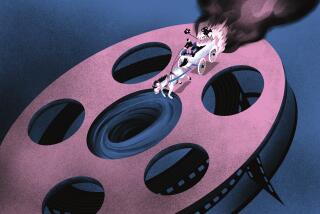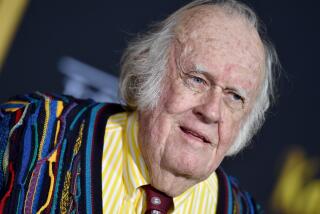Bert Schneider dies at 78; ‘Easy Rider’ producer
Bert Schneider, the iconoclastic producer behind a trio of influential movies — “Easy Rider,” “Five Easy Pieces” and “The Last Picture Show” — that captured the rootlessness and discontent of the late 1960s and ‘70s and became symbols of a new era in Hollywood, has died. He was 78.
Schneider had been in failing health and died of natural causes Monday at Olympia Medical Center in Los Angeles, said his daughter, Audrey Simon.
The son of a Hollywood power broker — his father, Abraham, ran Columbia Pictures in the late 1960s — Schneider helped revitalize moviemaking in the “New Hollywood” movement in which directors, not studios, held the creative reins and made movies that embraced the sensibilities of the emerging counterculture.
“This was a beginning of the independent movies and, more than that, a kind of celebration of anti-establishment movie subjects,” producer-director Bob Rafelson, who was one of Schneider’s partners in the company that produced “Easy Rider” and six other films, said in an interview Tuesday.
“Bert broke with everybody’s rules,” Rafelson said.
A political activist who was close to 1960s radicals Huey Newton and Abbie Hoffman, Schneider produced 11 films between 1968 and 1981, including the Oscar-winning, anti-Vietnam-War documentary “Hearts and Minds” (1974) and the Terrence Malick-directed drama “Days of Heaven” (1978).
With Rafelson, Schneider also created the Monkees, the popular made-for-TV rock quartet modeled on the Beatles who starred in their own Emmy-winning sitcom from 1966 to 1968.
The success of the Monkees — who consisted of Davy Jones, Mike Nesmith, Micky Dolenz and Peter Tork — provided the capital to finance “Easy Rider,” the landmark 1969 film about two motorcyclists in search of a more authentic America that made Jack Nicholson a star.
The movie, directed by Dennis Hopper, who also co-starred with Peter Fonda, changed the game in Hollywood. Made for less than $300,000, it grossed $20 million, paving the way for a new wave of American directors, such as Rafelson, George Lucas, George Roy Hill, Paul Mazursky and Sydney Pollack, who could tell unconventional stories on relatively modest budgets.
BBS — Schneider’s production company with Rafelson and Steve Blauner — not only produced three major movies but “gave huge impetus to the new Hollywood revolution that turned movies over to directors and created, in my view, the last Hollywood renaissance of great movies,” film historian Peter Biskind said Tuesday. “Bert played a crucial role in it.”
“Easy Rider” teetered on the brink of disaster many times, in large part because of Hopper’s extensive drug use. But Schneider championed Hopper.
Despite Hopper’s initial objections, he also insisted on casting Nicholson as an alcoholic lawyer who joins Hopper and Fonda on a climactic, mescaline-fueled pilgrimage to New Orleans.
“Bert insisted that I use him and finally I said, ‘Bert, I’ll do it for you, but he’s gonna ruin my movie,’” Hopper told The Times in 1999. “Bert wanted Jack because he needed a watchdog to make sure we weren’t pissing away all his money.”
At the screening for 50 Columbia executives, all but one were repulsed by the film’s anti-establishment tone and walked out.
One of the executives was Schneider’s father, who was then chairman of Columbia.
“My father hated the movie so much he forbid my mother from seeing it,” Schneider recalled in the 1999 Times article.
The next movie from BBS was “Five Easy Pieces” (1970). Directed by Rafelson, it starred Nicholson as an upper-class dropout involved with a small-town waitress played by Karen Black. Like “Easy Rider,” it was hailed by critics as an edgy portrait of a society in flux. Times movie critic Charles Champlin called it a “fine-grained, raucous, saddening, flawless piece of contemporary American portraiture which can in the best sense of the term be called this year’s ‘Easy Rider.’”
Schneider went on to produce “Drive, He Said,” directed by Nicholson; “A Safe Place,” directed by Henry Jaglom; and “The Last Picture Show,” directed by Peter Bogdanovich. All three films were released in 1971.
According to Rafelson, Schneider became disenchanted with making movies and in the 1970s shifted more of his energy into political activism.
The producer created a stir during the 1975 Oscars broadcast when, in the course of accepting the best documentary award for “Hearts and Minds,” he read a telegram offering “greetings of friendship” from the head of the North Vietnamese delegation to the Paris peace talks. Bob Hope and Frank Sinatra issued a protest statement and, according to Rafelson, nearly got into a fistfight with Schneider backstage.
Schneider was a deeply committed leftist who helped Black Panthers co-founder Newton escape to Cuba to avoid prosecution on murder charges in 1974. During this period, Schneider also helped support Chicago Eight defendant Hoffman when he went underground after skipping bail on drug charges that he said had been manufactured by the authorities.
Born in New York City on May 5, 1933, Schneider was a Cornell University dropout who later went to work for his father at Screen Gems, the television division of Columbia Pictures. He quit Screen Gems in 1965 to form Raybert Productions with Rafelson.
Beset by personal problems, including long-standing substance abuse and a 2007 fire that destroyed his home in Beverly Hills, Schneider was estranged from his children and many of his friends and colleagues in his later years, his family said.
Schneider was married four times. In addition to his daughter, who lives in Deep River, Conn., he is survived by a son, Jeffrey, of San Anselmo, Calif., and four grandchildren. A memorial service is being planned.
More to Read
Start your day right
Sign up for Essential California for the L.A. Times biggest news, features and recommendations in your inbox six days a week.
You may occasionally receive promotional content from the Los Angeles Times.







